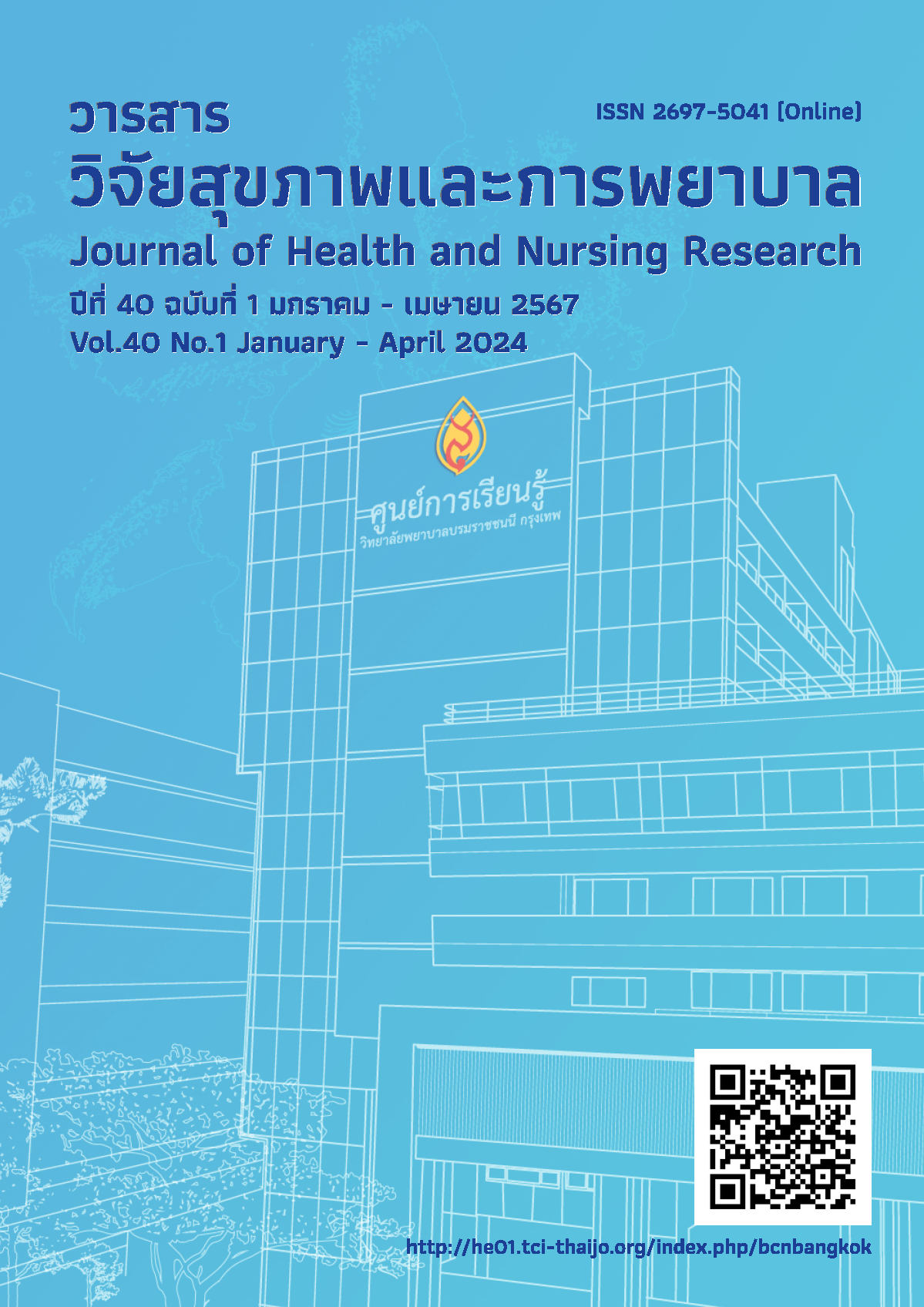The PEN-3 Model: การประยุกต์ใช้เพื่อการวางแผนพัฒนาพฤติกรรมสุขภาพ
คำสำคัญ:
การส่งเสริมสุขภาพ , สุขศึกษา , รูปแบบการวางแผนบทคัดย่อ
บทนำ: การพัฒนาพฤติกรรมสุขภาพของประชาชน เพื่อการมีสุขภาวะที่ดี จำเป็นต้องมีการวางแผนและออกแบบโปรแกรมการส่งเสริมสุขภาพให้สอดคล้องกับบริบทของกลุ่มเป้าหมาย สังคม และวัฒนธรรม เพื่อทำให้การนำไปใช้มีประสิทธิภาพสูงสุด
วัตถุประสงค์: เพื่อนำเสนอแนวคิดและการประยุกต์ใช้ The PEN-3 Model ในการวางแผนและออกแบบโปรแกรมเพื่อการพัฒนาพฤติกรรมสุขภาพให้แก่ประชาชน
ประเด็นสำคัญ: การวางแผนและออกแบบโปรแกรมตาม The PEN-3 Model ต้องคำนึงถึงตัวอักษรภาษาอังกฤษ คือ P-E-N จำนวน 3 มิติ โดยมีขั้นตอนดังนี้ ขั้นตอนที่ 1 เป็นการศึกษามิติที่ 1 คือ ลักษณะของปัญหา (P: Person (บุคคล), E: Extended family (ครอบครัว), N: Neighborhood (บุคคลในชุมชน)) ขั้นตอนที่ 2 เป็นการศึกษามิติที่ 2 คือ สาเหตุของปัญหา (P: Perceptions (ปัญหาจากปัจจัยส่วนบุคคล), E: Enablers (ปัญหาจากปัจจัยเอื้อ), N: Nurturers (ปัญหาจากปัจจัยเสริมจากบุคคลอื่น)) และขั้นตอนที่ 3 เป็นการศึกษามิติที่ 3 คือ ลักษณะทางวัฒนธรรม (P: Positive (วัฒนธรรมของสังคมที่ช่วยสนับสนุน), E: Existential (วัฒนธรรมของสังคมในปัจจุบัน), N: Negative (วัฒนธรรมของสังคมที่ขัดขวางและเป็นอุปสรรค) และเมื่อได้ข้อมูลทั้ง 3 มิติแล้วสามารถนำข้อมูลดังกล่าวมาใช้ในการวางแผนและออกแบบโปรแกรมการส่งเสริมสุขภาพ เพื่อให้กลุ่มเป้าหมายมีพฤติกรรมสุขภาพที่พึงประสงค์และนำมาสู่การมีสุขภาวะที่ดีต่อไป
สรุป: The PEN-3 Model สามารถประยุกต์ใช้ในการวางแผนและออกแบบที่จะสามารถทำให้โปรแกรมที่ได้สอดคล้องกับบริบทของกลุ่มเป้าหมาย สภาพปัญหา และสังคมวัฒนธรรม เพื่อให้โปรแกรมที่ได้มีประสิทธิผลสูงสุด
ข้อเสนอแนะ: นักส่งเสริมสุขภาพสามารถนำแนวทางที่นำเสนอไปใช้ในการวางแผนและออกแบบโปรแกรมการส่งเสริมสุขภาพให้แก่ประชาชนได้
Downloads
เอกสารอ้างอิง
Strategy and Planning Division. Thailand health care system foresight [Internet]. 2023 May. [cited 2023 Sep 12]. Available from: https://dmsic.moph.go.th/index/detail/9331. (in Thai)
Jidawatana A. Creating participatory public policy for health. 4th ed. Bangkok: Beyond Publishing; 2010. (in Thai)
World Health Organization. The determinant of health [Internet]. 2017. [cited 2023 Sep 30]. Available from: https://www.who.int/news-room/questions-and-answers/item/determinants-of-health.
Pensirinpa N. Health education and health promotion. 3rd ed. Nonthaburi: Sukhothai Thammathirat Open University Printing House; 2020. (in Thai)
Samphawamana O, Klaypugsee L, Arwut P, Phaenoi S. The development of chronic disease management for patients in a health promotion hospital: a case study of Maluan health promotion hospital, Phunphin district, Suratthani province. Nursing Journal of The Ministry of Public Health 2017;27(1):157-67. (in Thai)
Ponrachom C, Sukolpuk M, Guiedthatree S. Designing program for health behavior modification: intervention mapping. Journal of Health and Nursing Research 2022;38(2):1-10. (in Thai)
Airhihenbuwa CO. A conceptual model for culturally appropriate health education programs in developing countries. International Quarterly of Community Health Education 1990;11(1):53-62. doi: 10.2190/LPKH-PMPJ-DBW9-FP6X.
Dadipoor S, Alavi A, Kader Z, Mohseni S, Eshaghi SH, Shahabi N. Predictive power of PEN-3 cultural model in cervical cancer screening among women: a cross- sectional study in South of Iran. BioMedical Central Cancer 2023;23(1):730. doi.org/10.1186/s12885-023-11240-3.
Mehri A, Zarbi S, Hosseini ZS, Joveini H, Shahrabadi R, Hashemian M. Application of PEN-3 model in promoting early detection of breast cancer in women living on the suburbs. Payesh Journal 2023; 22(4):433-41. doi: 10.61186/payesh22.4.433.
Blackstone S, Iwelunmor J, Plange-Rhule J, Gyamfi J, Quakyi NK, Ntim M, et al. “I believe High Blood pressure can kill me”: using the PEN-3Cultural Model to understand patients' perceptions of an intervention to control hypertension in Ghana. Ethnicity & Health 2019;24(3):257-70. doi: 10.1080/13557858.2017.1346178.
Hiratsuka VY, Trinidad SB, Avey JP, Robinson RF. Application of the PEN-3 model to tobacco Initiation, use, and cessation among American Indian and Alaska native adults. Health Promotion Practice 2016;17(4):471-81. doi: 10.1177/1524839916648909.
Dunleavy VO, Chudnovskaya E, Phillips J, McFarlane SJ. Applying the PEN-3 cultural model to address HIV/AIDS prevention in rural Guatemala. Journal of Intercultural Communication Research 2018;47(1):1-20. doi: 10.1080/17475759.2017.1398178.
Airhihenbuwa CO. Georgia State University research magazine: A global perspective [Internet].2023 [cited 2024 Jan 22]. Available from: https://news.gsu.edu/research-magazine/fall2019/a-global-perspective
Jin L, Acharya L. Developing tailored messages to improve mental health and adjustment of International Students. Journal of International Student 2022;124:817-42. doi: 10.32674/jis.v12i4.393.
ดาวน์โหลด
เผยแพร่แล้ว
รูปแบบการอ้างอิง
ฉบับ
ประเภทบทความ
สัญญาอนุญาต
ลิขสิทธิ์ (c) 2024 วารสารวิจัยสุขภาพและการพยาบาล (วารสารวิทยาลัยพยาบาลบรมราชชนนี กรุงเทพ)

อนุญาตภายใต้เงื่อนไข Creative Commons Attribution-NonCommercial 4.0 International License.
บทความที่ได้รับการตีพิมพ์ เป็นลิขสิทธิ์ของวารสารวิจัยสุขภาพและการพยาบาล (วิทยาลัยพยาบาลบรมราชชนนี กรุงเทพ) ไม่สามารถนำไปตีพิมพ์ซ้ำในวารสารฉบับอื่น


















